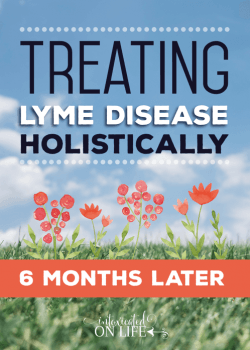I was one of the lucky ones.
After over a year of my general doctor running tests and sending me to different specialists, I tentatively questioned if Lyme disease might be worth investigating.
My doctor agreed: it was a good idea. But he also admitted that he knew the tests were terribly unreliable and I’d need a good Lyme doctor to help me figure out if this was indeed causing all of my mysterious symptoms.
He referred me to a colleague who helped guide me through the early stages of Lyme testing and getting my diagnosis.

I’ll forever be grateful for my doctor’s honesty. He knew he didn’t understand Lyme well enough. He knew certain tests were sadly unreliable. And he was gracious enough to help me search for answers when most doctors would have scoffed.
What’s so hard about finding a Lyme doctor anyhow?
If you’ve landed on this post, you probably already know the answer. But for those who are at the beginning stages of investigating Lyme disease, let me fill you in.
You see, most doctors (even infectious disease doctors) simply don’t understand Lyme disease (particularly chronic Lyme)—and some are certainly not humble enough to admit they don’t really understand this disease. Many doctors don’t even believe chronic Lyme exists.
To make matters worse, testing is unreliable and notoriously inaccurate, particularly the standard tests most doctors will run. If you happen (by some grand miracle) to test positive for Lyme on one of those standard tests, the doctors will most likely throw a couple weeks of antibiotics at you and call it good.
Yeah…that’s not so good. And likely it won’t help much at all.
When it comes right down to it, there’s been precious little research done on this complex disease. Doctors at large have not been educated about what the good research out there actually says about Lyme. All they know is the outdated and ineffective guidelines passed down from the CDC.
The doctors that are really making an impact are those that have gone out of their way to dig into the research. They’ve spent time educating themselves and working intimately with their patients (none of this 5-minute office visit ridiculousness when you’re dealing with Lyme!).
Strategies for Finding a Good Lyme Doctor
The first thing I did after my Lyme diagnosis was spend as much time and mental energy (no small feat for a Lymie) as I could researching Lyme disease. I needed to understand a little more what treatment options were available and how they compared.
I had a general idea that I wanted to find a good integrative LLMD (Lyme Literate Medical Doctor) to help guide me through the treatment process. I wanted a doctor who would take the best that modern medicine has to offer while also understanding what other alternative treatment modalities could bring to the table.
- Determine what kind of treatment you want to pursue. Are you looking for a doctor who leans primarily on antibiotics and prescription medications? One who primarily uses alternative treatments? Or a doctor who uses both?
- Collect names of potential doctors using reputable websites. There are several websites that will give you referrals for LLMDs. Some of my favorites are the following:
- ILADS Doctor Search
- LymeNet Doctor Search (you’ll need to post your request in the forum and you’ll be emailed with referrals)
- Lyme Disease Associate Doctor Referral
- State-Specific Lyme Facebook Groups (check out any Facebook groups about Lyme disease for the state you live in and ask for referrals)
- Check the doctors out. Don’t just go with the first Lyme doctor you find. Since most good LLMDs don’t accept insurance, you’ll want to make sure you’re not wasting your money or time on a dud.
- Look for doctor reviews online or in online forums.
- Join Lyme groups on Facebook and ask about the doctors you’re considering.
- Find local Lyme support groups to attend where you’ll be able to ask about the doctors people are seeing and learn what their track record is.
Don’t be afraid to fire your doctor and look for a new one. Sometimes you meet a doctor and they’re just not a good fit.
While I’m very grateful for my first LLMD, I didn’t stick with him long. I found out soon after my diagnosis that while he did use some alternative treatments he leaned quite heavily on long-term antibiotic treatments which I wanted to avoid. He was an incredibly knowledgeable, caring, and compassionate doctor, but I was looking for a different type of treatment.
Good luck on your doctor search!
If you’ve found a great LLMD, share with us in the comments what strategies you used to find them!











I’ve just started Coartem, first few day were OK, day three sent me to bed, day four i figured i better get going so as not to loos muscle mass, but it is a real effort just to walk. Chills, weakness joint and muscle pain (which i had anyway but this made it times 50%) wow who knew i could feel worse. That I know of I have Babiosis . Since 2017 have used various cycles of antibiotics but never months of treatment. Can I expect to feel this crappy for 6 months, which is the recommendation?
I cycled on and off of coartem. It was very difficult for me to take and the first few rounds were particularly difficult. I had to take a short round, then spend time doing major detox. Back and forth and eventually the rounds got easier as there was less and less babesia.
Can you share with me the physician that helped diagnose your Lyme disease? I’m also in Michigan and need help finding a diagnosis.
Dr. Natzke in Grand Blanc, MI. I hope you can find someone to help!
Thank you! Is it Gerald Natzke, D.O.?
I saw Dr. Natzke. He has changed the name of this company time and again because of bad reviews and has found a way to keep those reviews off line now. He treated me for mold without the blood work to see if I had it. When I got the blood work, I did not have mold. His wife and partner was very yisterical all the time about everything and I did not find them to be based on solid organized means to get to the source of the problem. To make matter worse, he opened a new office claiming to be an evironmental doctor and it was filled with carcinogenic furniture and carpet…you name it….he seems totally unaware of what to do but just put air purifiers everywhere. I got so sick in his new office I stopped going due to chemical sensitivity, but he lied and said he didn’t have enough money to do it right. He has money!! and he just did not know what he was doing and failed to be humble enough to admit it and tell the truth….which is the right thing to do. Yet he, like some other docs he associates with claim to be Christian but don’t live up to it. The truth will set you free!!
Is he the one you had success with? I’m in Lansing looking for a Lyme doctor… have been struggling with Lyme since 2015 diagnosis.
this was very informative. thank you for posting. i am diagnosed with fibromyalgia but a dr recommended seeing a lyme specialist.
Anyone know if Kaiser in Northern California has a Lyme’s specialist?
I was diagnosed with Lyme disease 5 years ago and was taking Antibiotics and Nonsteroidal anti-Inflammatory drug which seemed to help. However, I still suffer from some of the symptoms. My symptoms have always been chronic fatigue, joint pain, and even neurological problems in controlling hand and leg movements. I am a 54 year old female. the Antibiotics wasn’t really working and I could not tolerate them for long due to severe side effects, There has been little if any progress in finding a cure or reliable treatment. Acupuncture eased my anxiety a bit. Our primary physician recommended me to kycuyu health clinic and their amazing Lyme treatment. My symptoms including chronic fatigue, joint pain and rash, disappeared after 4 months treatment! The herbal treatment is a sensation.. My Lyme disease is totally reversed! this is a herbal store that will be leaving it’s footprint in this world. I’m 54 and have never been this healthier